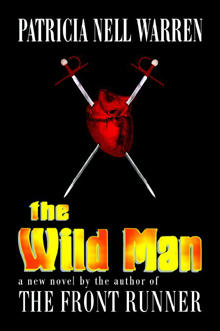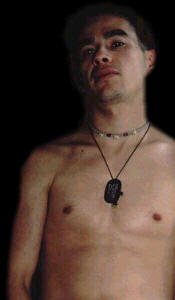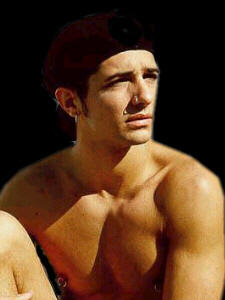 |
|
by Patricia Nell Warren Model Photos Courtesy of Badpuppy The Wild Man by Patricia Nell Warren, Wildcat Press, 377 Pages, $19.95 ISBN: 1889135054  After the Stonewall Rebellion in 1969 the Gay / Lesbian Community began its
modern journey toward full equality. Older gays and lesbians taught and
encouraged us to fit into roles. One was the man, the other the woman in
"gay" relationships; or so we were told. Drag was big. Collegiate, clean
cut, stay in the closet types were looking for quiet bars and were afraid
someone would see them coming or going from the bar.
After the Stonewall Rebellion in 1969 the Gay / Lesbian Community began its
modern journey toward full equality. Older gays and lesbians taught and
encouraged us to fit into roles. One was the man, the other the woman in
"gay" relationships; or so we were told. Drag was big. Collegiate, clean
cut, stay in the closet types were looking for quiet bars and were afraid
someone would see them coming or going from the bar.
Subject to raids, police harassment, arrest, jail time, social ostracism, loss of jobs, family exile there was a desire to achieve fair treatment in all areas of life. We were all looking for "Mr. Right" Into this nightmare suddenly appeared a search light. A novel not portraying gays and lesbians as child molesters, old drunks, or committing suicide because of our "illness". First published in 1974, The Front Runner raced to international acclaim-- the first novel about gay love to become popular with the mainstream. Author, journalist, editorialist, Patricia Nell Warren created a gay literary monument with the searing reality of her own years in the sport, as a runner, sports activist, AAU official and reporter for Runner's World.
Henry Adams made a caustic observation over a hundred years ago. True now, as it has been true since the days of the Caesars and the first Christian Emperor and Pope. "Politics, as a practice, whatever its professions, has always been the systematic organization of hatreds." Hatreds built on fears and suspicions based in religions, countries, races, classes and human love. In La Cite Antique Fastel de Caulangge dissects history, "History studies not just facts and institutions, its real subject is the human spirit." With the above quotes in mind, it has taken me three readings of Patricia Nell Warren's The Wild Man to appreciate the levels at which this book can be read. "The Wild Man" has all the dynamics of Chabon's The Mysteries of Pittsburgh The hatred and conflict of family values. The scars those conflicts cause are alive and fresh waiting for the scabs to be torn off to release the puss festering below. Scars that cause pain for years and rarely heal. The Wild Man has the "Testosterone Syndrome". The conflict created when a man falls in love with a man from a different class. The pride of Juan, from the perceived lower class, not to be made a toy; used, exploited and thrown away. Which man, Antonio or Juan, is willing to give the physical expression of love, which will surrender their physical body; but not the emotional commitment of vulnerability? A constant tension and question that will hold your attention from the Prologue to the Postlogue.
Josephina (Jose) and Antonio, are the twin gay children of a Spanish family, old members of the aristocracy and history but short on money. Sera the daughter of an aristocratic family locked into an arranged marriage while in love with her childhood sweetheart. Juan, the brujo, (witch) laborer, whose different dreams, goals and loves evolve in intertwining but separate paths. Symmetry and asymmetry creating tension between two gay men and two gay women. Each plays off the others in many complex ways. Paco, the jealous younger son, whose Old Catholic and Fascist beliefs cause as much danger to the lovers as his views do to a society struggling with the pains of modernization. The Spain of the Fascist Dictator Francisco Franco and the Roman Catholic Church serve as backdrop for the start of the romance and lasts until the present. The Wild Man portrays the struggles of women with society. Love and lesbian love revealed in separate but carefully woven parts of the conflicts of Antonio and Juan. Sera and Josephina (Jose) have to deal with the patriarchal values of Rome and Madrid. A vicious team that still rules the world; Popes, Bishops, Protestant Fundamentalists, and Franco, the last ruling Fascist leader of the notorious triumvirate of Hitler, Mussolini, and Franco. I see the pictures and struggles of Sera and Jose and partially grasp their reality but still see the verity of their experience through the fog and filters of a man. The Wild Man is faithful to the time, 1969, just after Stonewall. It brings back memories of all the internalized homophobia, closetedness, fear and dangers common in all countries of that day except perhaps for Denmark and the north of Germany. Self-hatreds and doubts held because we believed what the church, society and family tried to teach us to believe about ourselves. The yoke of church and state making docile obedient lambs of people so they will not dare think to challenge the powers of the state or church.
 As Juan says to Jose, "First a religion yokes itself to the secular power.
The secular power enforces the religious rules and uses terror to do it.
The terror keeps the secular power and the religion in their place of
control. The perfect yoke, those two together, yoked as a team to keep
their control."
As Juan says to Jose, "First a religion yokes itself to the secular power.
The secular power enforces the religious rules and uses terror to do it.
The terror keeps the secular power and the religion in their place of
control. The perfect yoke, those two together, yoked as a team to keep
their control."
At a basic level, The Wild Man is a romance. A light pleasant read about two couples who struggle to find their love and relationship. A relationship enduring to this moment, 30+ years later. A family story, telling the tale love of youth. This book gives direction to gay teens living today. They can have love, relationships and success in their own lives. A message for the young reader that the taunts, slurs and physical abuse of Junior High, High School and even family can be overcome. Suicide or the violence of shooting the antagonists is not the only option. Today's gay-lesbian teen has the opportunity and choice to avoid the murder of their being. The Wild Man also tells the story that all loves are only established by struggle. For more mature reader the book brings memories of secret crushes, desires, lust and loves of the late 1960s and early 1970s. It revives the sweet and sour that lingers on our palate -- a remembrance of lives lived. Readers with knowledge of today's most challenging issues will find satisfaction. Separation of church and state, environmental issues, cultural differences aggravated by globalization, all brought into focus by the foreshadowing used by the author. Written by an American, The Wild Man does not hide America's flaws. It validation to views held by other peoples of the world. As Antonio states, "I'll never surrender my manhood to a Yanqui." The accuracy of Ms. Warrens research and intimate knowledge of the subjects makes you question her nationality. I am as convinced as the child who is looking for the "Hogwarts Express" that somewhere in California all four heroes are living on their ranch. If perchance Juan, Antonio, Sera or Jose read this review, I want to express my appreciation to the four of you for sharing your lives. Ms. Warren has given them life and enduring value in book form. Good literature, enduring literature must speak by example to multiple generations of people. The Wild Man will speak with relevance for many years. During all three readings I sat alone with pad and pencil looking for errors, character flaws, confusing passages. At the top of the page I wrote three headings: Errors of fact: Errors of Characterization: and Problems of Plot: I know there has to be something. All books have flaws. I will let those flaws be found by another reviewer or reader. The Wild Man haunts, satisfies, stirs, and stimulates. A must read! Order through Wildcat Press: www.wildcatpress.com |
 © 1997-2002 BEI
© 1997-2002 BEI

 The Wild Man has been gestating for thirty years. Wisdom dictates
history, be it of country, society or relationships, is best written from
the perspective of 30 or 40 years. Consider the relationships of Eleanor
Roosevelt and Loreena Hitchcock, Sir John Gilgud and his hidden lover
of 25 years, Rock Hudson and the many boy toys he paid for in secret.
The Wild Man has been gestating for thirty years. Wisdom dictates
history, be it of country, society or relationships, is best written from
the perspective of 30 or 40 years. Consider the relationships of Eleanor
Roosevelt and Loreena Hitchcock, Sir John Gilgud and his hidden lover
of 25 years, Rock Hudson and the many boy toys he paid for in secret.